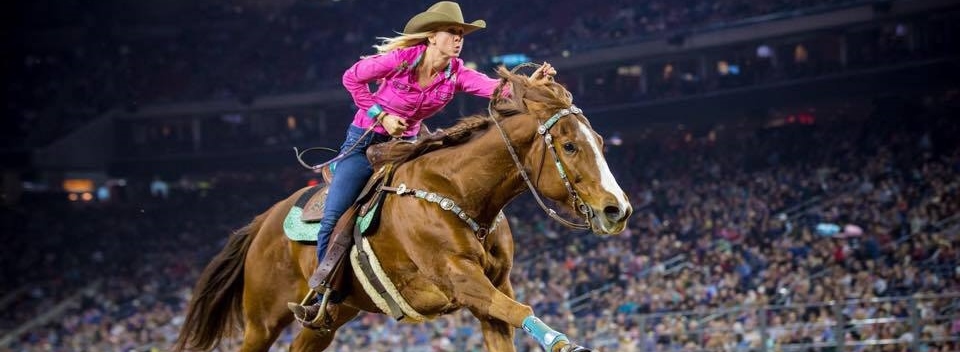Telling Their Stories: Women on Horseback
Elyssa Ford, Northwest Missouri State University
This is an abstract that was written for the 5th International Anniversary Conference Celebrating Women’s Stories, held in Baia Mare, Romania. Due to budget restrictions and a limited travel schedule, I was unable to attend the conference. While some of my ideas have evolved since this abstract (written in 2013), I still see an importance in what it wanted to do – to focus on the women themselves and the stories they want to tell about themselves.

NCTA Aggie Women’s Rodeo Team is in third place of the Great Plains intercollegiate region. Members are Tara Spatz, Trotwood, Ohio; Tryssta Duval, Max; Lexus Kelsch, McLaughlin, S.D., and Erica Mowery, Middleburg, Penn. (Tori Rossenbach photo). https://ncta.unl.edu/news-releases/aggie-barrel-racer-leads-national-ranks
When I began my research on American women in the rodeo and on other women on horseback, I expected to find individuals who at their core were feminists. While I did not anticipate finding feminists who fit into the vein of those in the 2nd wave like Betty Friedan who consciously fought to change the position (social, economic, and political) of women in America, I did believe that these women, because of their unorthodox actions and their very clear rebellion against accepted female norms, would have a connection to feminism and to other feminists on both a conscious and subconscious level. What I found surprised me. Rather than identifying women who consciously connected to feminism and who were interested in adjusting gender norms, I instead found women who often were quite conservative in their approach to gender roles. While they might break tradition outside the home when riding their horses, few actually want to change their position – either within the home or the rodeo arena. This conflict is what I would like to discuss at this conference. In the process of my research, I have conducted numerous interviews with women in many types of rodeos – the professional circuit, local rodeos, black rodeos, American Indian rodeos, and charreadas (the Mexican rodeo). The women in almost all of these interviews explained that they often had fought against repression to get involved in the rodeo and to ride their horses, and many of them discussed the limitations that women continue to face in the rodeo. Yet, few of the women expressed a desire to confront or really break down those limitations. Thus, the issue of staying true to their stories rises to the fore. As historians, we must tell the stories of the people, here the women, who we research, even if at times the results are surprising to us and conflict with what we might believe, or at least want to believe, is happening.

Ann Scott. http://womeninrodeo.com/women-rodeo-trail-ann-scott/
This discussion raises several key issues tied to the feminist movement. As numerous people, such as Jo Freeman in her BITCH Manifesto in 1968, pointed out, not all women were feminists and not all women agreed with feminism. This has been the case throughout history. Many women opposed the early suffrage movement in America; other women opposed the feminists of the 1960s and 70s; and many women today consider feminists and feminism to be a “dirty” word. What I propose to do is talk about some of these women who in action appear feminists yet shrink from the title and even much that it stands for. My focus is to show that these women are often more complex than they at first appear and are more complex than their words might demonstrate.
